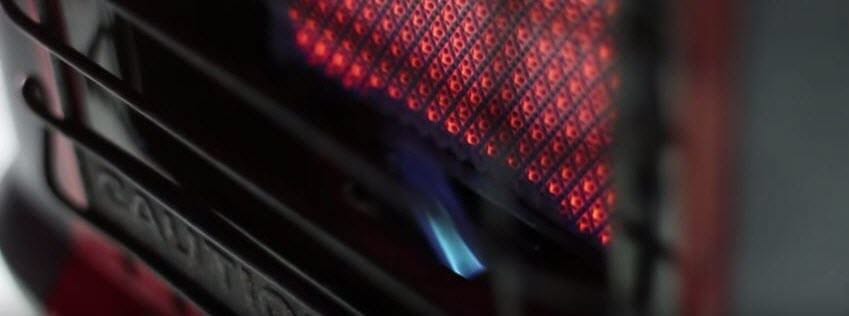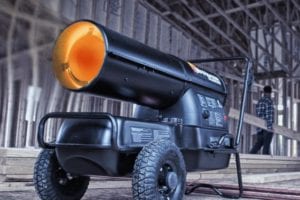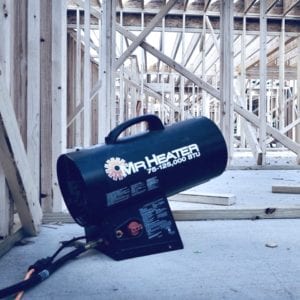Though they are common at job sites, you can’t take propane heaters for granted. Letting down your guard increases the risk of gas leaks, fires, burns, and worst of all – an explosion. Review these safety tips to protect you and your team.

Uses for Direct-Fired Heaters
Not only does this type of propane heater keep a work zone comfortable, it also keeps the surrounding area warm enough for tools and equipment, which might not operate well in colder temperatures. A construction propane heater can also help to cure drywall and concrete, making it suitable in building and remodeling. Other places where construction propane heaters work well are warehouses, agricultural buildings, and workshops.
General Safety Tips for Using Construction Propane Heaters
To use a propane heater safely, you must be aware of these dangers:
- Burns
- Explosions
- Fire
- Gas build-up
- Leaks

Avoiding Burns
- Always be conscious of the propane heater’s location. To prevent burns when working around one, long pants and long sleeves are recommended. When using a propane torch, you also need:
- Eye protection
- Heavy work gloves
- Protective boots
- When working outside with a propane torch, work behind a wind-break. Wind can cause the flame to jump about, potentially burning someone or something.
- After turning off a propane heater, allow it to cool down before touching it.
Avoiding Fire and Explosions
- Understand where you can and can’t use the propane heater. Some heaters can only be used inside, while other types must only be used outdoors.
- Only use a direct-fired propane heater when it’s on a level surface.
- Don’t use a propane heater close to a propane tank or other flammable/explosive material.
- Keep a general clearance area around the heater, and don’t allow others to place items near it.
- Don’t use the heater in an enclosed area.
- This may seem obvious, but don’t allow anyone to smoke around a propane heater.
- After turning off the propane heater:
- Allow it to cool down before moving it into storage.
- Make sure the gas valve on the propane tank is completely closed.
- Store the gas tank separately from the propane heater.
Avoiding Gas Build-Up
Ventilation is imperative when using a propane heater to avoid buildup of carbon monoxide or leaked propane gas. Consult a Pro Tool & Supply expert or the heater’s manual to tell you how much ventilation is required for the size of your propane heater.
 Avoiding Gas Leaks
Avoiding Gas Leaks
A propane gas leak can fill up a work area and push out the oxygen, overwhelming workers. It can also be an explosion hazard. If you smell gas or propane, immediately turn off the heater and investigate.
Here are a few ways to detect a leak before it becomes a big problem.
- Only people who can detect smells and know the smell of propane should be around the heater. Propane manufacturers add a “rotten egg” odor to the gas to alert you in case of a leak.
- A careless connection or worn-out part can cause a leak. Always check the connections to the propane heater, the hose, and the gas tank. You can also discover leaks by spraying a soap and water solution on the connected areas and looking for bubbles.
- Escaping gas makes a hissing sound that can be heard if you listen carefully.
Not Sure which Construction Propane Heater is Best for You?
Our experts can help you decide from our selection of construction propane heaters. We also have propane heater rentals that you can try out by renting for a single day or more. Already know what you want? Request a quote or call us at (857) 706-2980. Our representatives are ready to help you heat all your winter jobs.


 Avoiding Gas Leaks
Avoiding Gas Leaks
